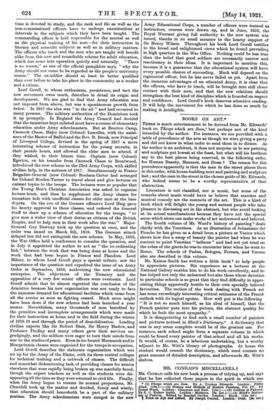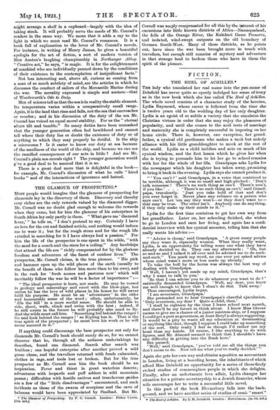MR. CONRAD'S MISCELLANEA.t
Ms. CONRAD calls his new book a process of tidying up, and says that he has collected these papers in the spirit in which one • (1) Things which are Seen. By A. Tryetan Edwards. London : Philip Allan. [184.1—(2) History and Methods of Modern Painting, Vol. IV. BY Tames Ward. London: Chapman and Hall. C.)—(5) Looking at Pictures. By 8. C. Kaines Smith. London : Methuen. 6s. net.]—(4) Black's Diction- ary of Pictures. Bdlted by Randall Davies. don : Black. (12a. 6d.1 I Note* on We end .Deri. By Joseph Conrad. London : Dent. Inc net.] might arrange a shelf in a cupboard—largely with the idea of taking stock. It will probably serve the needs of Mr. Conrad's readers in the same way. We mean that it adds a ray to the light in which we must read Mr. Conrad's romances. It is a book full of explanation to the lover of Mr. Conrad's novels. For instance, in writing of Henry James, he gives a beautiful apologia for the art of fiction, a sort of modern version of Miss Austen's laughing championship in Northanger Abbey. " Creative art." he says, " is magic. It is for the enlightenment of mankind who are individually penned down by the conditions of their existence to the contemplation of insignificant facts."
Not less interesting and, above all, curious as coming from a man of so much subtlety of mind, are the articles in which he discusses the conduct of sailors of the Mercantile Marine during the war. The morality expressed is simple and austere—that of Wordsworth's Ode to Duty.
Men of science tell us that the sea is in reality the stable element. Its temperature varies within a comparatively small range. Again, it is the land that rises and falls, not the sea that encroaches or recedes ; and in his discussion of the duty' of the sea Mr. Conrad has voiced an equal moral stability. For us the " eternal altars tilt and tumble." So many duties have been unmasked that the younger generation often feel bewildered and cannot tell where their duty lies or doubt the existence of duty or of anything to which they may properly be dutiful. Is the ship a microcosm ? Is it easier to know our duty at sea because of the smallness of the world of the ship, and because we can see the ramified consequences of our acts in little ? And are Mr. Conrad's plain sea-morals right ? The younger generation would g've a good deal to be assured that it is so.
There is a great deal more that is delightful in the book— for example, Mr. Conrad's discussion of what he calls " hired books " and of the interactions of ignorance and hatred.



































 Previous page
Previous page